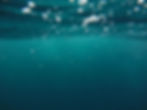My love for the ocean and all the marine animals in it has been somewhat of a roller coaster. I've always had a love for the ocean and all the wonders that live in it. However, I buried it when I went to high school because it wasn't cool. I didn't renew my love for the ocean until recently when I saw a seahorse carrying a q-tip and thought that is just f@*! up. My renewed love for the ocean came back in full force. Whale tail necklaces, adopting whales, banishing plastic as much as possible, and all. And it is also why I write this post today, about the ocean dead zones.

Dead Zones...
These dead zones are areas in the oceans and/or lakes that have little to no oxygen. Aquatic animals can't live there because there is no oxygen. If a marine animal happens to get swept up in it or loses its way and finds itself there, it will die. And yes... this does happen.

What Causes This?
The fertilizer from our livestock and their feed crops somehow ends up in our waterways. Here's how it happens... in just 6 steps:
Animals poop, right? Onto the grass or ground it goes.
When it rains, it washes the manure and other fertilizers into the rivers.
Manure is rich in nutrients, making it really great for soil and plants to grow. With the manure going into the rivers, algae will grow. The algae thrive and create algae colonies.
When the algae start to decompose, it uses up all the oxygen in the water.
So, any marine animals in that area of the water end up not being able to breathe because the algae soaked up all the oxygen in the water.
Since the colonies thrive at this time and are very abundant in the water, this means they span in a large area of the water. And because all the oxygen is gone... the entire area can no longer support life.
In fact, the dead zone in the Gulf of Mexico has grown larger than the state of New Jersey!

If this continues, we will ruin the ocean, the lives of the beautiful animals that live in it, and our ecosystem. Not to mention, the Omega-3 foods that come out of the ocean are good for our brain!
Who Is the Biggest Contributor of Ocean Dead Zones?
Industrial farming. In a recent post, I wrote about industrial farming and how much we need to raise our voices for our small farms that implement the right practices.
Industrial farming is the BIGGEST contributor to water pollution and ocean dead zones.
There are only 4 companies that produce the majority of all our livestock and crops that feed us. The problem has been brought to their attention and yet still no change has been seen. They say they are addressing the problem but I have yet to see a plan or any change to help the ocean and our environment.

Unfortanately, dead zones can impact many things... not just marine animals and the ocean. It can impact:
The fishing industry
Tourism
Our drinking water
Coastal ecosystems
These ocean dead zones are unacceptable.
What Can You Do?
As someone who loves the ocean, visiting and all, I don't live by one. So, besides supporting marine conservation and doing what I can to get rid of plastics and chemicals in my house, what can I do?
I have done a lot of writing. I have written postcards to people in that line of work and to the government. Some big companies I have written to about this issue are Tyson, Cargill, Smithfield Foods, and JBS USA along with some local government.
Write to these companies and tell them you re'upset about their practices. Tell them you care about the animals we share the planet with. Tell them to protect our water, clean up their downstream messes, make a plan to transition to sustainable practices, and to implement this plan in a clear and measurable way so the public can start seeming some positive changes.

Write to your government. Tell them to enforce stricter water pollution limits and permits. Tell them to enforce laws that these companies have to abide by to clean up their pollution. Tell them to give serious penalities for any infractions on these pollution rules. And tell them it is time to make a switch... invest in sustainable farming.

Ashley Allen
Licensed Brain Health Trainer
Owner of SustainaBrain
